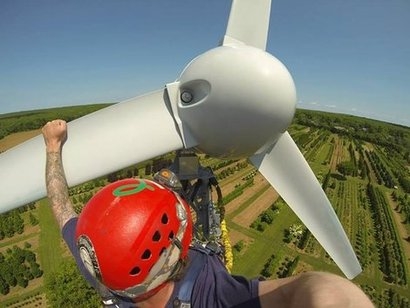
As wind farm owners and investors prioritise critical equipment maintenance, reduce subcontractor reliance and adopt virtual working practices for non-essential kit monitoring and analysis, operational and technology teams have fast-tracked a new working framework for wind turbine operations and maintenance that will drive future operational efficiencies, post COVID-19.
This is according to a detailed survey of globally diverse senior wind executives, working across the wind technology and operations space. Today’s published findings are a result of research undertaken by Onyx InSight, a predictive analytics partner for asset owners and operators, as part of an ongoing project, with phase two due in May 2020.
The research findings take into consideration a mix of qualitative and quantitative data points and, for the first time, provide a comprehensive overview and assessment of the immediate and expected impacts of the COVID-19 pandemic on wind farm operations and maintenance best practice. Key report findings directly connected to the evolution of future operational work practices, include:
An increased reliance on remote/virtual engineering assessment and analytics, in order to prioritise scheduled and unscheduled maintenance and repairs.
A rapid reduction in external subcontractors, coupled with increased overview and daily management of internal teams and their equipment.
Increased focus on tackling critical correctives, with an emphasis on deferring or delaying maintenance where not absolutely necessary.
“While there’s no question of the immediate, short term economic and operational challenges that the COVID-19 pandemic presents, it’s increasingly evident that as wind engineering and operational teams are forced to accelerate their adoption of remote working tools, previously unforeseen benefits for many are now being realised” said Dr. Ashley Crowther, V.P. Global Sales and Engineering at ONYX InSight. “In this respect, and as our global survey of senior wind executives makes evident, the adoption of what might currently be thought of as short term, temporary, working practices for operational teams may in truth provide an insight into further cost savings and operational efficiencies that will form the framework for future operations and maintenance best practice”.
While the survey respondents make clear that the shift from preventative to predictive-based maintenance strategies will accelerate, and that reducing the frequency of uptower work plays a key part in this, most senior executives already anticipate that delays today will result in a disproportionate amount of work undertaken in H2 2020. Many operators are therefore already concerned about the availability of quality labour and workmanship due to the current size and scale of layoffs and the ability for planned maintenance to be undertaken within revised project timescales.
Specifically in relation to labour availability and working practices, the report findings also identify that a delay in maintenance programmes has created a backlog of non-critical or discretionary operational challenges. While most respondents acknowledged that the reduction in this backlog could primarily be overcome through the return to work of fully-utilised operations and maintenance teams, some senior operational executives are already forecasting an increase in turbine reliability and performance failures as a direct result of these maintenance delays.
“Every day, we are trusted to track and support over 5,000 wind turbines all around the world” added Bryan Rabenau, V.P. Technology and Marketing. “This, combined with our established track record of providing technical project performance, reliability, design and investor due diligence support to more than 1,000 projects, provides us with a unique insight into wind operations and technology teams. As our research makes clear, the COVID-19 crisis leaves almost no area of the renewables market untouched – and its therefore beholden on all of those working within the market to share knowledge, risks and best practice, in order for the wind industry to learn lessons from this pandemic and to return stronger, as global wind adoption escalates.”
For additional information:

